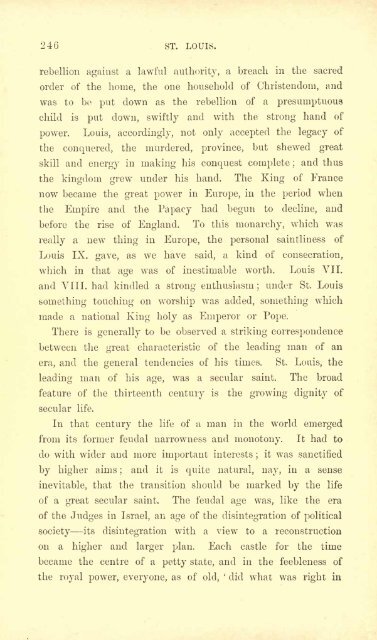Stoics and Saints - College of Stoic Philosophers
Stoics and Saints - College of Stoic Philosophers
Stoics and Saints - College of Stoic Philosophers
Create successful ePaper yourself
Turn your PDF publications into a flip-book with our unique Google optimized e-Paper software.
246 ST. LOUIS.<br />
rebellion against a lawful authority, a breach in the sacred<br />
order <strong>of</strong> the home, the one household <strong>of</strong> Christendom, <strong>and</strong><br />
was to be put down as the rebellion <strong>of</strong> a presumptuous<br />
child is<br />
put down, swiftly <strong>and</strong> with the strong h<strong>and</strong> <strong>of</strong><br />
power. Louis, accordingly, not only accepted the legacy <strong>of</strong><br />
the conquered, the murdered, province, but shewed great<br />
skill <strong>and</strong> energy in making his conquest complete ;<br />
<strong>and</strong> thus<br />
the kingdom grew under his h<strong>and</strong>. The King<br />
<strong>of</strong> France<br />
now became the great power in Europe, in the period when<br />
the Empire <strong>and</strong> the Papacy had begun to decline, <strong>and</strong><br />
before the rise <strong>of</strong> Engl<strong>and</strong>. To this monarchy,<br />
really a new thing in Europe, the personal<br />
which was<br />
saintlioess <strong>of</strong><br />
Louis IX. gave, as we have said, a kind <strong>of</strong> consecration,<br />
which in that age was <strong>of</strong> inestimable worth. Louis VII.<br />
<strong>and</strong> VIII. had kindled a strong enthusiasm ;<br />
under St. Louis<br />
something touching on worship was added, something which<br />
made a national King holy as Emperor or Pope.<br />
There is generally to be observed a striking correspondence<br />
between the great characteristic <strong>of</strong> the leading man <strong>of</strong> an<br />
era, <strong>and</strong> the general tendencies <strong>of</strong> his times. St. Louis, the<br />
leading man <strong>of</strong> his age, was a secular saint. The broad<br />
feature <strong>of</strong> the thirteenth century is the growing dignity <strong>of</strong><br />
secular<br />
life.<br />
In that century the life <strong>of</strong> a man in the world emerged<br />
from its former feudal narrowness <strong>and</strong> monotony. It had to<br />
do with wider <strong>and</strong> more important interests ;<br />
it was sanctified<br />
by higher aims ;<br />
<strong>and</strong> it is quite natural, nay,<br />
in a sense<br />
inevitable, that the transition should be marked by the life<br />
<strong>of</strong> a great secular saint. The feudal age was, like the era<br />
<strong>of</strong> the Judges in Israel, an age <strong>of</strong> the disintegration <strong>of</strong> political<br />
society its disintegration<br />
with a view to a reconstruction<br />
on a higher <strong>and</strong> larger plan. Each castle for the time<br />
became the centre <strong>of</strong> a petty state, <strong>and</strong> in the feebleness <strong>of</strong><br />
the royal power, everyone, as <strong>of</strong> old, did what was right in

















